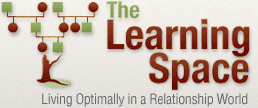The Learning Space Blog
Neurofeedback Training
Feedback on Two Days of Neurofeedback Training at the Western Pennsylvania Family Center
As we start this New Year, I wanted to bring you some cheerful news of how neurofeedback training in the context of Bowen theory was introduced, with positive results, to several people in Pittsburgh. I was able to offer these sessions due to the interest, perseverance and work of Catherine Rakow. She was supported by Jim Smith, the current director of WPFC. People were offered two sessions a day, or even four sessions over two days, so they could experience intensive training. Perhaps it is like increasing the time you spend at the gym or in my case, at hot yoga. One difference, however, is at this gym you simply calm down to become mentally stronger. By calming down one is able to better observe the difference between one's feelings and one's thinking.
Bowen wrote in the book Family Evaluation, The human is the first form of life that has been able to observe the feeling process with his intellect. Thus far there are definite characteristics of those who can do this readily, and those who are a few years slower. The name of that is differentiation of self. Everyone can do that when they are more motivated to do it for themselves rather than when they are dependent on others. There is some evidence that the human can determine the functioning of his own emotional system through the control of his own emotionality. It goes in the direction of implying that the human can control his own evolution thought the control of his own emotional system. (pp. 385-386)
The people in the Pittsburgh group are among my earliest colleagues. Back in the eighties I drove Dr. Bowen to conferences sponsored by the WPFC. I’ve constantly found the people there courageous and forward thinking, perhaps influenced by the founder of the Western Pennsylvania Family Center, Paulina G. McCullough. Among other firsts, Paulina was one of the first people to work with Murray Bowen at Georgetown University back in the sixties, and the first to start a network program in Family Systems Theory, despite Bowen himself being dubious about the chances for the network’s success.
The main goal of the neurofeedback sessions was to give people enough of an experience on the equipment to see if neurofeedback was useful to them. There are many ways to manage self and control anxiety. Neurofeedback is one more tool for people who believe in the mind-body connection. The training allows your brain to find more comfortable electrical pathways through a slight interruption in the old patterns. When an interruption occurs, the music stops momentarily, alerting us to a change. The change is noted and we relax, as there is nothing to fear.
Over time, the training allows for increasing diversity and coherence to appear in the brain. It’s as though the software is designed to bring an individual “back to the present,” to relax and experience increasing comfort. This neurofeedback system is not diagnostic. Training is the same whether the individual's focus is on sports performance or just relaxing.
From a family systems perspective, I believe that it is accurate to hypothesize that the brain wave patterns in a family are mutually influencing one another. This keeps the anxiety between family members highly correlated. So when there is a change in one person that can be sustained over time, this change in one individual allows for slight changes in the way several people in the family relate to one another.
The training can produce slow changes, similar to the way one changes by working out at a gym. When one person in the family increases his or her flexibility, others in the family can be impacted. The goal is to alter or slow down participation in the automatic way we relate to one another. Any increase in self-focus can impact the reactivity in one’s important relationships. Read more....
Filed under Neurofeedback, Bowen family systems theory
Comments are closed for this post.
Blog Categories
Blog Archive
- June 2019
- December 2018
- October 2018
- June 2017
- February 2017
- July 2016
- February 2016
- November 2015
- August 2015
- June 2015
- April 2015
- February 2015
- December 2014
- October 2014
- September 2014
- August 2014
- July 2014
- June 2014
- May 2014
- April 2014
- March 2014
- December 2013
- October 2013
- August 2013
- July 2013
- June 2013
- April 2013
- February 2013
- January 2013
- December 2012
- August 2012
- July 2012
- June 2012
- March 2012
- February 2012
- January 2012
- December 2011
- November 2011
- October 2011
- September 2011
- August 2011
- July 2011
- June 2011
- May 2011
- March 2011
- January 2011
- December 2010
- November 2010
- October 2010
- September 2010
- May 2010
About the Learning Space
"The Learning Space is a creative, energetic thinking space for individuals striving to live optimally in all their most important relationships. The Learning Space provides a conceptual space—a place to consider and experience alternate ways of relating."
Read More »
Upcoming Events
view events »Newsletter
Fill out the form below to subscribe to The Learning Space's quarterly newsletter, and get exclusive invitations to special learning forums and other events.

